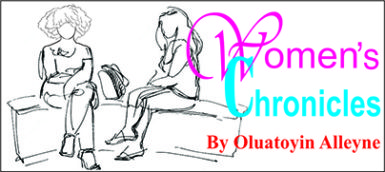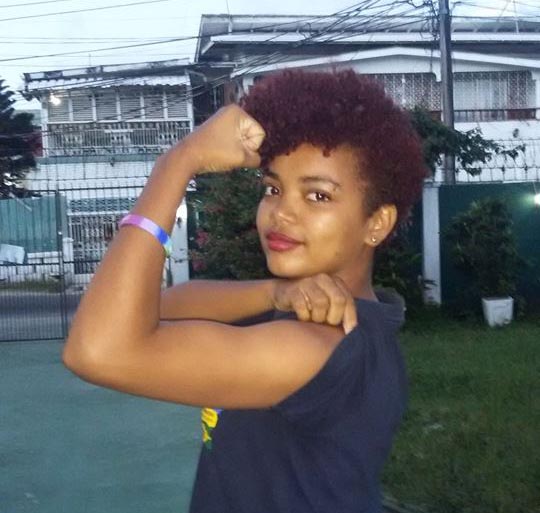“About a year or two ago I actually started being vocal and stuff. Before I was just one of these persons who just didn’t care [you know] just living my life because I thought nothing really ever concerned me.”
 At 21, Akola Thompson has lived through things that persons double her age are yet to experience. She has an active presence on social media and is a weekly columnist in the Guyana Chronicle. I was hesitant about speaking to her, but what won me over was the fact that she speaks openly on issues so many persons shy away from.
At 21, Akola Thompson has lived through things that persons double her age are yet to experience. She has an active presence on social media and is a weekly columnist in the Guyana Chronicle. I was hesitant about speaking to her, but what won me over was the fact that she speaks openly on issues so many persons shy away from.
“When we had the issue with [Minister] Volda Lawrence and the councillor Winston Harding and when she labelled the [alleged] sex abuse case as being a family matter, it got me so angry. And I didn’t see a lot of people talking about it. Then I saw Red Thread was holding a protest and I contacted somebody and found out the time. I actually left one of my UG classes and I went and that is how it started,” she said in reference to her advocacy.
“After that I would kept in contact with certain people I would have met, and began going to events and so and that is how my political development started. I would go to events and have conversations with some of these older women and then you would begin to evaluate some of the beliefs and values you would have had.”
She speaks rapidly, sometimes with an intense facial expression.
“A lot of time when I speak on certain issues, I am very mean, and I would like – call people out; some folks don’t like that, but I know the reason behind why I do that,” she said about what some may describe as the abrasive manner in which she approaches persons.
I had intended to raise the matter with her, as even though I wanted her to control the narrative there were a few issues that needed clearing up.
“[You see] it was not so long ago that I myself held some of those same beliefs and if it wasn’t for people who called me out [I would have still been there] and they were very raw and being honest.
“We are not all born progressive, because we are shaped by society’s values so when you actively start to question some of these ideals, you have to unlearn some of the conditioning that goes into it.
“It wasn’t so long ago that I was moderately pro-life to abortion and now I am pro-abortion and the reason why I was pro-life because I was very misinformed. I was told abortion was wrong and that is what I grow up to believing until people started challenging me.”
At this point she switched the conversation, surprising even me.
“One of the reason I got so angry at the Volda Lawrence thing is because when I was about 13, I had moved with my father to Grenada. And you know daughters and fathers always have this attachment; I loved my father so much. I moved to Grenada and it began to feel weird after the first few days. I saw him looking at me funny and one night he came and started touching me and I started to cry and he stopped. And even though he would have apologised several times I could never really get back to that space I had before. I am always uncomfortable around him.”
There was obvious pain as she shared this experience but as I looked at her, I got the sense that she is good at masking.
I asked her how comfortable she was talking openly about her abuse not only with me, but with the public and if she wasn’t afraid of her father’s reaction.
“I shared it on the internet before…,” she said. “I wrote it and before I published it on my blog I went to my aunts [her father’s sisters] and even though they felt sorry there was this kind of victim blaming. I published it and since I have been able to publicly talk about it.
“After this, he sent me a text that said, ‘I heard that you are telling people that I molested you when you were younger but know I still love you.’
“In that text, it seemed that he was not accepting responsibility even though he would have apologised for it several times in the past.
“I sent him back a message telling him yes. After that I saw him about twice and he acted normal and we never talked about it again,” she said.
“I think people underestimate the importance of social spaces where you could share your experiences. Because a lot times you have stuff you have to talk about, or experiences and feelings that you feel only you alone are dealing with and when an opportunity opens now where you see people willing to hear your story that is important.”
She then, with a laugh, asked me whether I had any questions.
I said I had none, but then after second thoughts I did ask her again about her abrasive attitude and I threw in the term ‘cyber bulling.’
“People only see when I shoot down, but I have strong points on women’s issues and LGBT issues. I would go and ask questions and try to provide information and even after this they would still come with misguided views and that makes me angry,” her palms were folded into a fist as she spoke, anger maybe, or just intensity.
“I know it was only because of people challenging me that I was able to think about it and re-evaluate the points of view I had,” she continued.
“A lot of times people message me and say I am a young lady and should not be saying certain stuff…”
Like what? I asked. Before she answered, I questioned whether it was her penchant to use profanities on social media during her discussions.
“Yes, like cursing, and I am always talking about reproductive health and they don’t like that. I have never bought into the idea that women should be seen and not heard, even before my advocacy.”
I asked what her mother thought.
“I have never lived with my mother even though technically I lived with her, but she is always working. She has a business in the interior. I grew up with my grandparents. Since I was young we have always been close whenever we met up but there was never that space. And sometimes I wish she was around more, but she offers all the support that she can and I am very grateful,” she answered.
“I remember when my father would have molested me, the first person I told was my mother and immediately she would have sent a ticket for me to go home. It always meant so much to me that she never once doubted me.”
Akola is the only child for her mother, she has siblings by her father.
“My mother is still working, she will be coming home soon for Christmas.”
Akola is also a single parent.
“I have five-year-old daughter. I was a teenage mother; those were interesting times.
“When I got pregnant, my mother was such a big foundation she gave me the option of aborting or keeping the child and that was so important because I felt like I had a choice. A lot of times with young women, they are forced into abortion or to keep the child because of religious or morality reasons of their parents.
“I kept Athena and that experience was one of the reasons I am so vocal about women’s right and their rights to abortion. Because we keep monitoring women’s bodies, telling them that they need our permission to have abortion.”
She paused for a while and I took the opportunity to ask her why she described her pregnancy as interesting.
“You know, you are young and you think that it was the person. I ended up convincing my mother to go live with him and his family. I was 15, I gave birth at 16.
“I was living with him and his family and after a while he started hitting me. He hit me in front of his family. And sometimes they would say stop but would not make an active duty to stop him and it would continue. Eventually it got so bad and I decided it was enough. We were sleeping over at one of his family, I can’t remember what the incident was, but he wrapped a belt around my throat and started choking me. The family members started shouting for him to stop. After he fell asleep I packed my bag and took my baby and left while everybody was sleeping.
“I never went back. He would try to come around, call my family and they themselves, not my mother, would try to tell me to go back but I never went back, and I have never regretted that decision.”
I expressed the opinion that she has experienced much in her short life time. She laughed, throwing back her head with what she called her “navy blue” dyed hair. I did not join in the laughter because there were myriad thoughts going through my mind; I wondered if her experiences were not too much for her tiny shoulders.
“Yeah, I know people get so surprised when I tell them I am 21 and they would say ‘wow I thought you were older.’
“While I would have not wanted to go through certain things, I think certain experiences shape who you are as a person.
“Everybody have their own experience that would hinder parts of their social development, but I feel like when you have certain experiences you are in a better position to understand and relate to the experiences of others,” she said.
“I feel like all of those experiences are connected to my advocacy, because I am not sure if I had not had those experiences that I would have felt so strongly about abuse and that was actually one of the driving factors why I ended up joining that Red Thread protest.
“And it was out of that I began to develop myself more politically and challenged some of the ideas I had.”
I told her rumour has it that she was abused by her former partner Ruel Johnson and whether she was not a hypocrite for not calling him out and ensuring he faced the consequences of his actions.
She said she has heard the rumour too and it was not true; I believed her.
“You can say it, I don’t mind; I was never abused by Ruel Johnson.”
The conversation was over as she had said “quite a mouthful”- her words.










